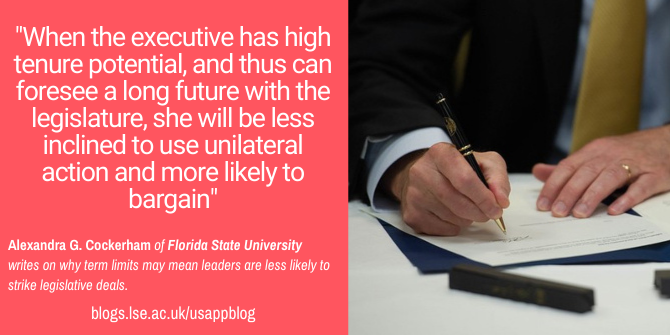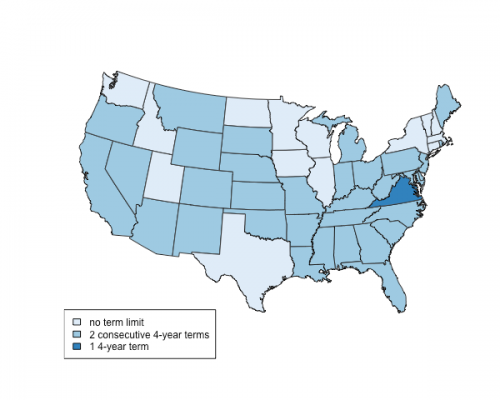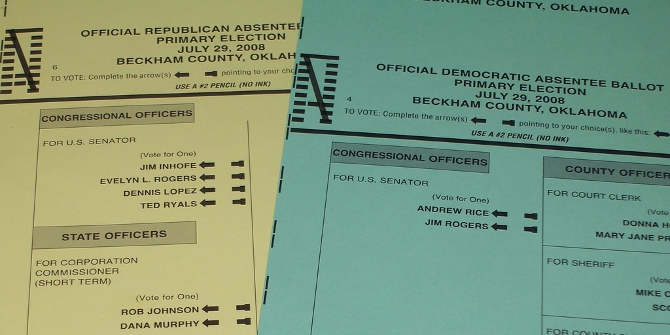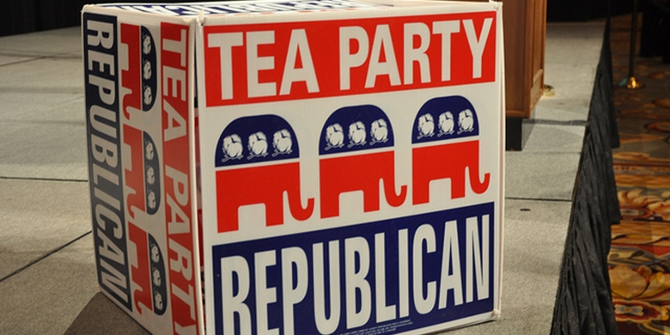 For many, term limits are a way of checking the power of government executives. In new research, Alexandra G. Cockerham challenges these assumptions. Analyzing bargaining between the legislature and executive across states with and without gubernatorial term limits, she finds that such limits mean that governors are more likely to take unilateral action. By contrast, executives who are not term-limited are likely to be more experienced in bargaining and have a greater incentive to maintain a good relationship with the legislature.
For many, term limits are a way of checking the power of government executives. In new research, Alexandra G. Cockerham challenges these assumptions. Analyzing bargaining between the legislature and executive across states with and without gubernatorial term limits, she finds that such limits mean that governors are more likely to take unilateral action. By contrast, executives who are not term-limited are likely to be more experienced in bargaining and have a greater incentive to maintain a good relationship with the legislature.
Numerous scholars and participants in the political process affirm that highly independent executives in government – such as presidents and state governors – are a threat to the balance of power and democratic stability more generally. This widely held belief is based upon the fact that extensive executive power will lead to a breakdown in the balance of powers between the executive and the legislature. Given the fact that balance of powers is a cornerstone of American democracy, we see many attempts to limit executive power at both the federal and state level to address any potential imbalance.
Although presidential term limits were not established formally until 1947, gubernatorial term limits have existed since the American Revolution in large part because of the colonists’ aversion to the governors appointed by the British crown. In recent work, I challenge the assumption that term limits constrain executive power and create desirable democratic outcomes. By examining the effects of executive term limits on inter-branch bargaining, demonstrated by the use of unilateral action, I bring to light some potentially concerning implications for governance in states where governors are term limited.
Term limits and executive bargaining
Term limits pose an obstacle to executive bargaining in two ways: (1) they constrain the executive’s tenure potential making her less concerned with maintaining a working relationship with the legislature; and (2) constrain the executive’s ability to gain experience negotiating with the legislature, thereby making bargaining more costly.

“06-04-2019 Ceremonial Bill Signing and E” (CC BY-NC 2.0) by Governor of Virginia Ralph Northam
The theory assumes that as an executive’s expected success from bargaining with the legislature declines, she has greater incentive to take unilateral action. One of the primary mechanisms through which term limits affect the executive’s propensity to bargain is through their effect on the executive’s tenure potential: her potential to remain in office. Presidential scholars have little reason to theorize about the impact of tenure potential since all US presidents serving after Harry Truman have been limited to two four-year terms in office, ensuring that there is no variation across presidents in the potential to remain in office. An executive’s tenure potential is just one of two means through which term limits influence an executive’s incentive to act unilaterally. His experience in office is a second important factor, since greater experience should enhance his expected success from bargaining, and thus reduce his incentive to take unilateral action.
Measuring the effects of tenure and experience on the likelihood of executive action
Estimating both the effects of tenure potential and experience in office on an executive’s propensity to take unilateral action is a challenge. Greater time served should give an executive more experience in bargaining with the legislature and thus less of a need to take unilateral action; but at the same time, greater time served (when combined with a term limit) should bring him closer to being forced out of office and make him less concerned with alienating the legislature by taking unilateral action. These competing effects are difficult to parse out empirically because the US president and most governors are limited to no more than two consecutive four-year terms in office, and for these executives, experience (number of years served) is perfectly inversely related with tenure potential (maximum number of years remaining in office). However, by expanding attention to include, as well, governors with no term limit—each of whom have greater tenure potential than any term-limited governor—this empirical challenge can be overcome.
Figure 1 – Executive term limits in the US states

Note: Among states with 2 consecutive 4-year terms, entities vary regarding whether this is a lifetime term limit or if incumbents can serve again upon sitting out of office for a period. Additionally, among states with no gubernatorial term limit, only two states’ governors serve unlimited two-year terms, while the rest serve unlimited four-year terms.
Statistical analysis suggests that when the executive has high tenure potential, and thus can foresee a long future with the legislature, she will be less inclined to use unilateral action and more likely to bargain. In addition, executives take less unilateral action as they gain more experience bargaining through continued service in office. These findings imply that executive term limits promote unilateral executive action and are an impediment to executive bargaining because they restrict the executive’s tenure potential and force her out of office when she is most willing and able to bargain with the legislature.
Term limits are one part of a complex system of executive power
With an eye towards separation of powers systems there are and must be implications related to the relative power of the chief executive vis a vis the legislature. The implications of eliminating executive term limits at the state level may be especially concerning since there is a lot of variance in both executive powers and legislative powers across states. A fair number of state legislatures are part time, and some meet every other year. Governance in a state with a part time legislature and a governor with high levels of tenure potential may look very different than a state with both a full-time legislature and a term limited governor.
There is no clear-cut answer here except to consider the complexity that comes along with this variance in power across states. These results suggest that a non-term limited governor is more likely to engage in inter-branch bargaining. However, propensity to bargain with the legislature is only one standard by which to judge governance. Whether or not the states with non-term limited governors and comparatively weak legislatures have objectively “better” public policy is a question for future research.
- This article is based on the paper, ‘Going it Alone: The Adverse Effect of Executive Term Limits on Bargaining’ in in State and Local Government Review.
Please read our comments policy before commenting.
Note: This article gives the views of the author, and not the position of USAPP – American Politics and Policy, nor the London School of Economics.
Shortened URL for this post: https://bit.ly/3mZT33d
About the author
 Alexandra G. Cockerham – Florida State University
Alexandra G. Cockerham – Florida State University
Alexandra G. Cockerham is an Assistant Teaching Professor and the resident political scientist in the Interdisciplinary Social Science program at Florida State University. Her research interests center on executive power, with an eye toward the limitations that institutions impose on directly elected executives. She regularly teaches research methods and evidence based public policy but across all classes encourages her students to more critically consume social information, recognizing that the social world is more complex than the many sources that try to tell us how we should be thinking about something.






